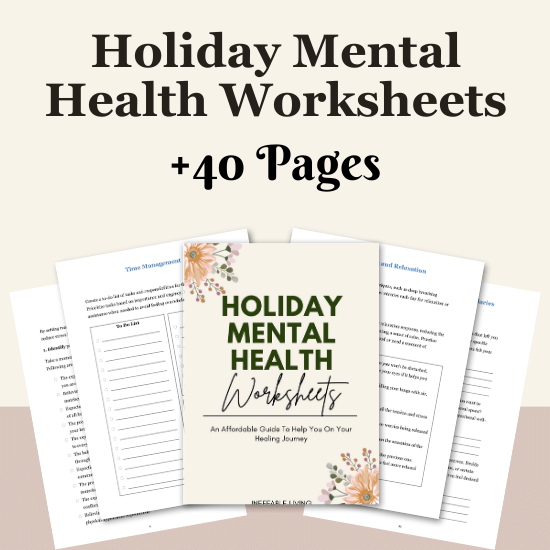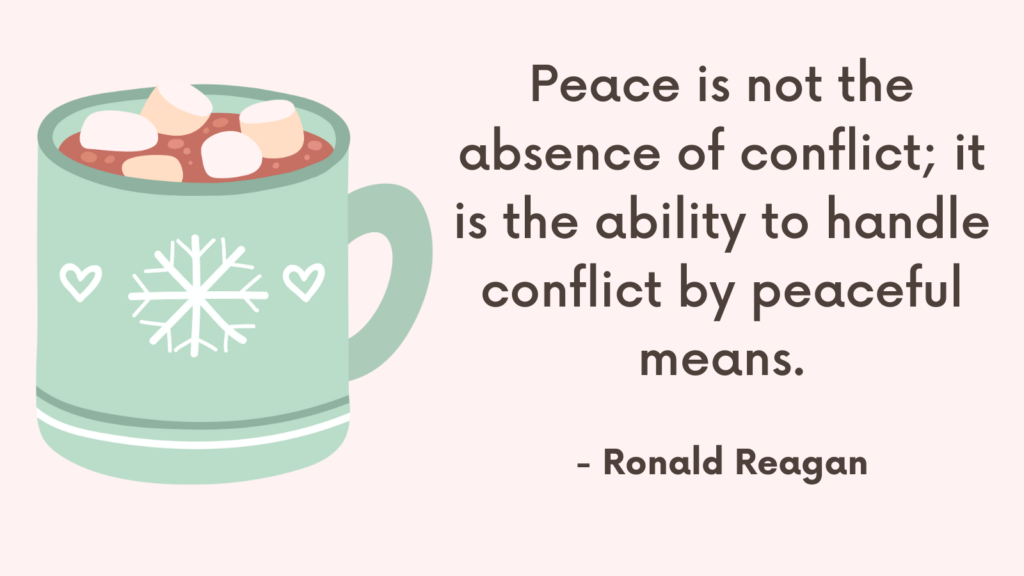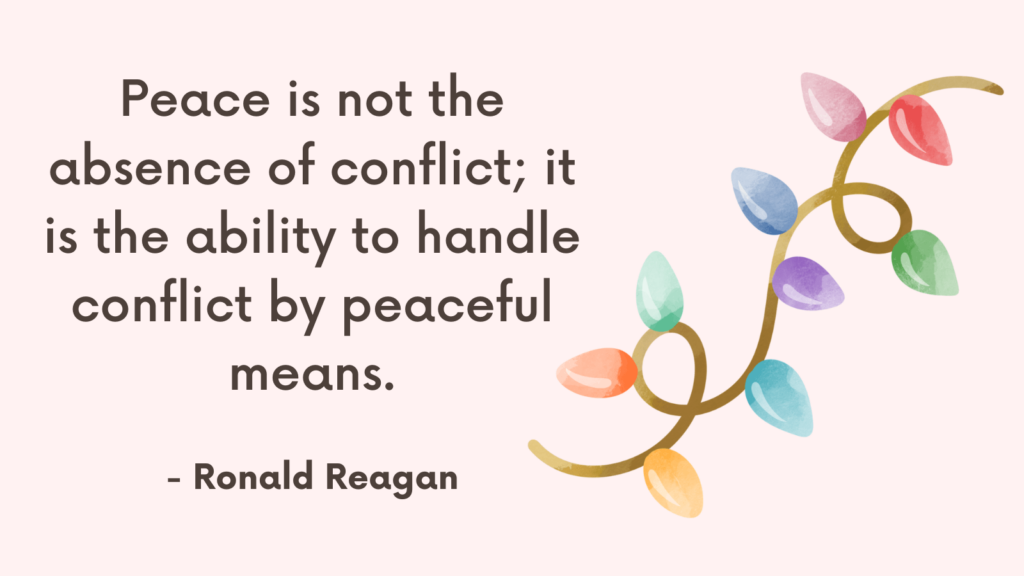The holidays can bring loved ones together but also create tense situations when conflicts arise.
Here are some strategies to help you navigate family gatherings with patience and harmony.
How to Manage Family Conflicts at Holiday Gatherings?
1. Set Clear Intentions Beforehand
Going into a family gathering with clear intentions can help you stay focused and calm. Think about how you want to show up and what matters most to you.
– Tip: Before the event, take a few moments to set personal goals, such as enjoying the time, avoiding contentious topics, or practicing patience.
2. Practice Active Listening
Listening fully without interrupting can help diffuse tension and make others feel respected. It also shows that you’re genuinely interested in understanding their perspective, even if you don’t agree.
– Tip: When someone speaks, nod to show you’re listening, ask clarifying questions, and avoid planning your response while they’re talking.
Related: Top 5 Tips On How To Be Assertive Without Being Rude
3. Choose Your Battles Wisely
Not every comment or disagreement needs to turn into a full discussion. Decide ahead of time which topics or behaviors are worth engaging with and which ones are best ignored.
– Tip: If a sensitive topic comes up, ask yourself, “Is this worth addressing, or can I let it go?” Often, letting minor issues pass helps keep the peace.
Related: How to Use Assertive Communication at Work?
4. Use “I” Statements for Clear Communication
When addressing conflicts, focus on how you feel rather than blaming the other person. This approach reduces defensiveness and opens the door to constructive dialogue.
– Example: Instead of saying, “You always interrupt me,” try, “I feel unheard when I’m interrupted and would appreciate a chance to finish my thoughts.”
5. Establish Boundaries Around Sensitive Topics
If you know certain subjects are likely to cause conflict (e.g., politics, finances), agree with family members to set these topics aside for the gathering. Boundaries create a respectful atmosphere and allow everyone to enjoy the time together.
– Tip: When a topic crosses a boundary, calmly steer the conversation elsewhere or politely excuse yourself from the discussion.
Related: Top 35 Boundaries Affirmations To Help You Become More Assertive
6. Take Breaks When Needed
Family gatherings can feel overwhelming, especially if tensions are high. Stepping away for a few minutes to clear your head can prevent reactions driven by stress.
– Tip: Plan ahead for a short walk or a moment outside. These breaks provide time to breathe, reset, and come back with a calmer mindset.
7. Redirect Conversations to Positive or Neutral Topics
When you sense tension, guide the conversation to safer subjects. Light-hearted topics like favorite memories, holiday plans, or mutual interests can bring the group back to a positive place.
Related: Best 10 Books On Being Assertive
8. Have a Support System in Place
Talk with a trusted friend or family member ahead of time who can support you. Knowing someone is there to understand and empathize can make it easier to handle challenging situations.
– Tip: Agree to check in with this person if you need a breather, or share a quick phone call after the event to debrief.
9. Focus on Empathy and Compassion
Remember that everyone brings their own stress, expectations, and personal history to the table. Practicing empathy helps you approach conflicts with kindness rather than judgment.
– Tip: Remind yourself that others may not always be aware of how their behavior affects others. Putting yourself in their shoes can help soften your response.
Related: How To Validate Someone’s Feelings Without Agreeing? (+Examples of Validating Statements)
10. Practice Self-Care Before and After
Prepare for family gatherings by doing things that help you feel grounded and calm. Afterward, take some time to unwind and reflect on what went well.
– Tip: Practice relaxation techniques like deep breathing or meditation before and after family gatherings to center yourself and let go of any residual stress.
Related: How to Respond When Someone Is Being Vulnerable?

Common Sources of Conflict at Holiday Gatherings
1. Unresolved Family History
Past arguments, long-standing grudges, or old wounds often resurface when everyone is under one roof. Even if the original conflict is never discussed, the emotional residue can linger beneath the surface, making certain interactions feel heavier or more reactive than they should.
2. Differing Beliefs and Values
Holidays often bring together people with very different views — on politics, religion, parenting, lifestyle choices, or cultural traditions. When these differences are expressed (or challenged), conversations can quickly turn defensive or confrontational.
3. High Emotional Expectations
Many people enter family gatherings with the hope that everything will be perfect — that everyone will get along, old issues will stay buried, and this year will finally feel “right.” These idealized expectations often clash with reality, leading to disappointment, frustration, or emotional withdrawal.
4. Pressure to Conform to Family Roles
Family gatherings can unconsciously pull people back into outdated roles — the caretaker, the troublemaker, the overachiever, the peacemaker. Being forced into these roles can make people feel misunderstood or emotionally trapped, especially if they’ve grown or changed since the last gathering.
5. Alcohol and Overindulgence
Alcohol is often a part of holiday celebrations — but it can lower inhibitions and intensify emotions. What starts as a lighthearted conversation can quickly turn into an argument when boundaries are loosened and feelings rise to the surface.
Related: 10 Tips for Holiday Stress Management During Family Gatherings
6. Financial Stress
Money can be a sensitive subject during the holidays — especially when some family members are struggling and others are spending freely. Guilt, shame, envy, or subtle judgment around gifts, travel expenses, or contributions can lead to underlying tension.
7. Parenting and Generational Clashes
Parents may feel judged for their choices, grandparents may want more control, and child-free relatives may feel excluded. Differences in parenting styles, discipline, or lifestyle often spark unspoken criticism or passive-aggressive remarks that fuel conflict.
8. Unequal Distribution of Labor
One person often ends up doing most of the cooking, cleaning, or organizing — and if that work isn’t acknowledged or shared, resentment can build. Feeling unappreciated or taken for granted can create tension, even if no one says anything outright.
Conclusion
By approaching family gatherings with these strategies, you can create a supportive environment and manage conflicts more effectively.
Remember, the holidays are a time to connect and celebrate, so prioritizing peace and understanding will allow everyone to enjoy the season more fully.



